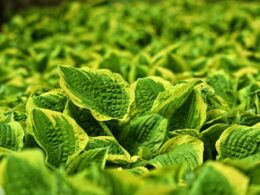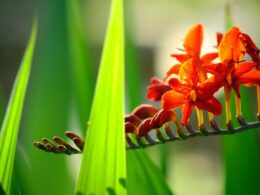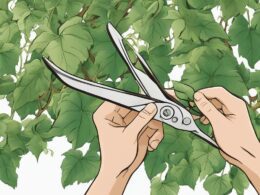Key Takeaways
- Trumpet vine, also known as trumpet creeper, is native to North America and contains a toxic substance called ‘cerbicine.’
- All parts of the plant are poisonous to equines if ingested.
- It’s essential to understand the potential risks and take measures to ensure your horse’s safety.
Understanding Trumpet Vine Toxicity in Horses
As a horse owner, it’s important to be aware of the potential dangers that certain plants can pose to your equine companions. One such plant is the trumpet vine, which can be found in many parts of the United States.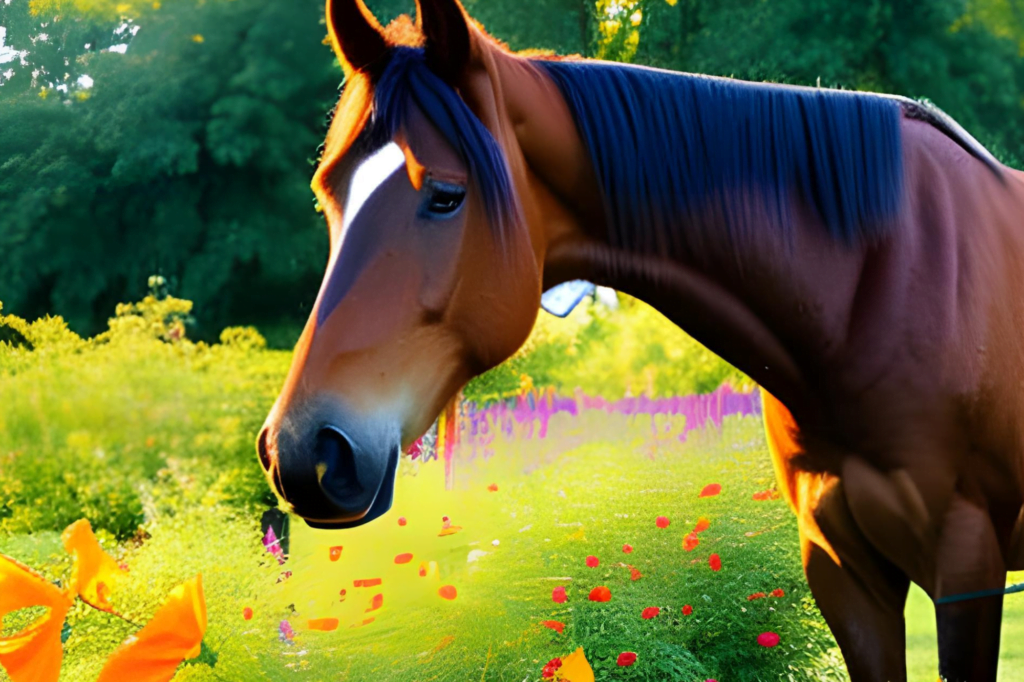 Trumpet vine, also known as Campsis radicans, contains toxic compounds that can cause a variety of health problems in horses. These compounds, including isorhamnetin and campferol, can lead to gastrointestinal distress, neurological issues, and even death in severe cases.
Trumpet vine, also known as Campsis radicans, contains toxic compounds that can cause a variety of health problems in horses. These compounds, including isorhamnetin and campferol, can lead to gastrointestinal distress, neurological issues, and even death in severe cases.
Effects of Trumpet Vine on Equines
The effects of trumpet vine toxicity on horses can vary depending on the amount of plant material ingested and the individual horse’s sensitivity to the toxins. Some common symptoms of trumpet vine poisoning in equines include:- Gastrointestinal upset, such as diarrhea and colic
- Difficulty breathing
- Neurological issues, including seizures and coordination problems
- Increased heart rate and blood pressure
- Dehydration
Equine Reaction to Trumpet Vine
It’s important to note that not all horses will react to trumpet vine in the same way. Some horses may be more sensitive to the toxic compounds in the plant, while others may be able to tolerate small amounts without showing any adverse effects. However, it’s always best to err on the side of caution when it comes to your horse’s health and avoid exposing them to trumpet vine whenever possible.Dangers of Trumpet Vine for Horses
Trumpet vine, also known as campsis radicans, is a plant that is commonly found in gardens and along fence lines. While trumpet vine can be an attractive addition to your landscape, it poses several dangers to horses if ingested.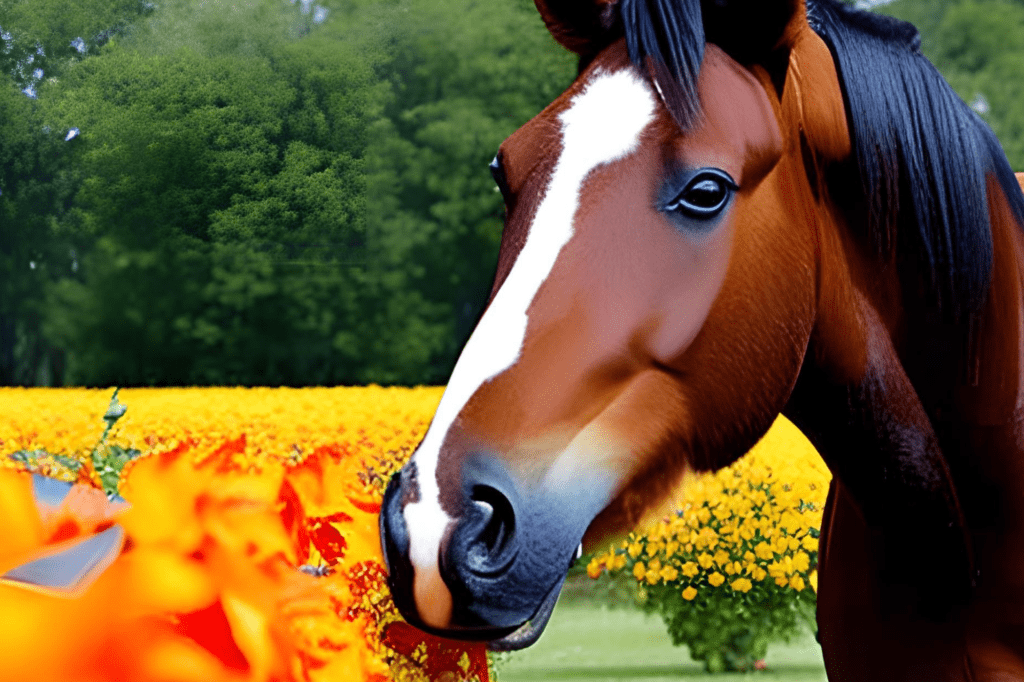 Ingesting trumpet vine can cause a range of symptoms in horses, including colic, diarrhea, and loss of appetite. Horses may also experience neurological symptoms such as disorientation, unsteadiness, and seizures. In severe cases, ingestion of trumpet vine can lead to death.
One of the biggest challenges with trumpet vine poisoning in horses is that the symptoms can take several days to become apparent. This means that by the time you notice that your horse is experiencing health problems, he may have already ingested a significant amount of the plant.
Ingesting trumpet vine can cause a range of symptoms in horses, including colic, diarrhea, and loss of appetite. Horses may also experience neurological symptoms such as disorientation, unsteadiness, and seizures. In severe cases, ingestion of trumpet vine can lead to death.
One of the biggest challenges with trumpet vine poisoning in horses is that the symptoms can take several days to become apparent. This means that by the time you notice that your horse is experiencing health problems, he may have already ingested a significant amount of the plant.
It is important to take trumpet vine poisoning seriously and seek veterinary care immediately if you suspect your horse has ingested this plant.In addition to the acute risks of trumpet vine ingestion, there are also potential long-term health effects for horses that have been exposed to this plant. Studies have shown that horses that have ingested trumpet vine over a prolonged period of time may be at a higher risk of developing liver problems and other chronic health issues. It is important for horse owners to monitor their pastures and ensure that there is no trumpet vine growing in areas where horses have access. When removing trumpet vine, it is crucial to wear gloves and other protective gear, as the sap can cause skin irritation. Overall, trumpet vine poses a serious threat to the health and well-being of horses. As a responsible horse owner, it is important to take measures to prevent exposure and seek prompt veterinary care if you suspect your horse has ingested this toxic plant.
Ensuring Equine Safety and Managing Trumpet Vine Exposure
If you have trumpet vines growing on your property, it is important to take steps to ensure the safety of your horses and minimize their exposure to this toxic plant. Here are some tips to help you manage the risks:Keep your horses away from the vines
The first step is to prevent your horses from grazing on or near trumpet vines. Fence off areas where the vines grow, and don’t allow horses to access them even when they are outside of their pasture.Remove trumpet vines from your property
In addition to keeping your horses away from the vines, it is also a good idea to remove them from your property entirely. This may involve digging up the roots and disposing of them carefully, or using herbicides to kill the vines.Provide alternative grazing options and supplements
If your horses don’t have access to their regular pasture because of trumpet vines, provide alternative grazing options or supplements to meet their nutritional needs. This could include hay, feed, or access to a different area of the property.Monitor your horses for signs of poisoning
Even with precautions in place, it’s still possible for your horses to come into contact with trumpet vines. Be sure to monitor them closely for signs of poisoning, including gastrointestinal distress, lack of appetite, and lethargy. If you suspect your horse has been exposed, contact your veterinarian immediately.Signs and Symptoms to Watch Out For
It’s important to keep an eye out for any signs or symptoms of trumpet vine poisoning in your horses, as early intervention can make all the difference. Here are some common indicators to watch out for:- Loss of appetite or refusal to eat
- Lethargy or weakness
- Difficulty breathing
- Trembling or shaking
- Diarrhea or colic-like symptoms
- Muscle spasms or convulsions
Remember: early intervention can make all the difference in the outcome of trumpet vine exposure.
Treating Trumpet Vine Toxicity in Equines
If you suspect your horse has been exposed to or ingested trumpet vine, it is crucial to seek veterinary care immediately. Time is of the essence when it comes to treating trumpet vine toxicity in equines. Typically, treatment for trumpet vine poisoning involves flushing the horse’s gastrointestinal system to remove any remaining plant material. In some cases, activated charcoal may be administered to help bind toxins and prevent their absorption into the bloodstream. Additionally, supportive care is often necessary to manage symptoms and promote the horse’s overall well-being. This may include the administration of intravenous fluids or medications to address pain, inflammation, and other complications. It is important to note that the severity of trumpet vine toxicity can vary widely depending on the amount ingested, the individual horse’s health and immune system, and other factors. As a result, a customized treatment plan tailored to your horse’s specific needs is essential for the best possible outcome. Remember, time is of the essence when it comes to treating trumpet vine toxicity in equines. If you suspect your horse has been exposed to or ingested this poisonous plant, contact your veterinarian immediately and follow their recommended treatment plan.Is Trumpet Vine Poisonous to Chickens and Equine?
Trumpet vine toxicity to chickens can be a concern for poultry owners. Ingesting any part of the trumpet vine, including flowers, leaves, or stems, can lead to severe poisoning in chickens and other equine animals. It’s crucial to ensure that these plants are kept out of reach, as symptoms of ingestion can include digestive distress, weakness, and even death.
Prevention and Horse-Friendly Alternatives
To prevent your equine from being exposed to the potential dangers of trumpet vine, it is crucial to take proactive measures. Here are some tips to help keep your horse safe:- Avoid planting trumpet vine near areas where your horse grazes or where it can be easily accessed.
- Regularly inspect your pastures and surrounding areas to ensure that trumpet vine is not growing.
- If you have trumpet vine growing on your property, remove it as soon as possible using appropriate protective gear.
- Consider planting horse-friendly alternatives, such as honeysuckle, morning glories, or black-eyed Susan.
Horse-Friendly Alternatives to Trumpet Vine
If you are looking for safe alternatives to trumpet vine, here are some options to consider:| Plant | Description |
|---|---|
| Honeysuckle | A climbing vine with fragrant, trumpet-shaped flowers that are safe for horses to be around. |
| Morning Glories | Another climbing vine with showy, brightly colored flowers that pose no danger to horses. |
| Black-Eyed Susan | A hardy flower that adds a burst of color to any landscape and is completely safe for horses to be around. |






